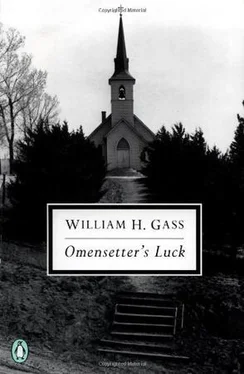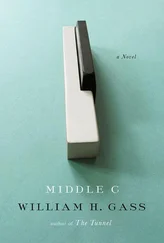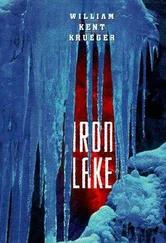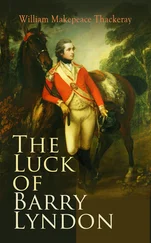Matthew, listen, believe in the Devil. I know you for a man who merely believes in God. Bad theology and careless observation, Matthew. You can believe me, for I have seen him. He and I are on familiar terms. He has a sharp tongue and strange ideas, like myself. We are friends in fact. Men have no other.
The shadows of the lamp were steady but the fire was like dark lace. Their voices were low and intense and filled with surprise; a continual thread of bewilderment and wonder held their words together. You are letting him die, she said, and it seemed to Furber he was hearing something that had been repeated already with an agonizing regularity, like the squeak of the rocker. Omensetter's protests were driven from him. With every word he seemed to wither and diminish. Soon speech would be beyond his strength.
… you are letting him die.
Luce—
You are.
Omensetter swayed rhythmically a moment like a bear.
I am letting him be. I am giving him a chance.
A chance to die, she said in a flat cold bitter voice.
Lucy—
She was wasted too, but like a wire. She had lost the fullness of her pregnancy; her skin was pale and drawn, her bones lay like shadows under it; even her astonishing breasts seemed drained, though with the child not feeding, they should have been swollen painfully.
. . just letting him.
There's no other way.
She rose from the rocker like an angry gesture.
Where is my husband, she said in a whisper.
Then she slid back to the chair. Tick, it said.
Omensetter squatted by her, reaching out.
She brushed at his hands as though they were bugs in her lap.
Luce—
They have forgotten the children as they have forgotten me, Furber thought. He turned toward the girls, and they froze his heart.
How can I know what to do? Fetch Orcutt? Does a hen give her eggs to a weasel?
Let him die, then.
Her fingers flew in her hair.
You'd take more trouble for a cat, she said.
There's nothing anyone can do.
He may have taken death already just from hearing you.
He mustn't.
Musn’t …
We've got to trust my luck.
We've a baby — sick. Isn't that enough? What do people do when their baby's sick? That's all I want — what anyone would want — what you'd have wanted once — nothing strange ornew or put on — just what's ordinary — decent — human. Now I look at you — the way you've been — all set on something I can't understand — so crazy — hunching in your self where I can't feel you — and I think it can't be true — your changes — they just can't be true.
I don't want to change. I'm trying not to.
I thought I knew what I loved.
I want to — I'm trying to do what I've always done—
It's worse — Brackett, will you believe me? — it's worse than losing that poor baby — losing you. But I can't trade the baby for you, can I?
Oh no — no — no trade—
You won't be the same. Is that a trade?
What's this now? I don't want a trade.
What will I do when you're dead too?
Don't talk that way.
This is the son I thought you wanted.
Don't—
We loved each other once. Why don't we feel the same love now — now when we need to? Why must we live in these lonely pieces?
We had it on my luck.
All our life till now is nothing — luck — a raindrop hitting. And our beauty? Brackett, is it a weed, annoying you where it comes up? All our life till now I could live in easy, breathe in easy — swallow easy — loving you. It was as though — as though you'd taken room in me — with that I could be happy. But it was luck, you say, just luck. And when I came to you with my arms before me like a present of flowers? And when I said sweet heart, dear love… do you remember? Never a foolish name. Dear heart, I said, dear love—
Omensetter attempted to throw himself in his wife's lap, but the arm of the rocker prevented him and his head slid onto her chest, while he flung one arm awkwardly around her.
For Henry. You are letting him die because of Henry.
No.
And you are killing me.
I love you.
You are killing them.
Lucy—
All of us.
I love you.
For Henry — is this for Henry? Did you love Henry more to kill him sooner?
Omensetter clumsily reached his feet.
Those men — they suspect you, don't they? I could see it. They hate us. Why?
I am no mur-der-er, Omensetter howled, raising his arms like weapons above his head. I am no mur-der-er! Can't you see? Should I tear away my skin? Would you see inside me then, and see how my life ceases when you speak this way to me?
The daughters stirred, beginning to weep, and Omensetter turned, remembering them. Furber extended his arms, but they careened down the hall, blindly striking the walls as they went like bewildered birds. Furber sank, groaning, to his knees.
He had fathered every folly, every sin. No goat knew gluttony like his, no cat had felt his pride, no crow his avarice. He had said the psalm against envy, the psalm against anger, the psalm against sloth and the loss of hope, but they were no defense. He had wanted women. He had imagined them in every posture. He had wanted men. There was no perversity he had not thought to practice with them. Further, he had wanted little girls. He had wanted boys. He had wanted most of all himself. He had stolen. He had blasphemed. He had cheated. He had lied — his single skill. He had been cruel and contemptuous, malicious and willful. He'd lacked courage, piety, loyalty, hope. Without moderation or charity, without relish or enthusiasm, he'd led a wanton, heedless, selfish life. In meanness, in darkness and squalor of spirit, he had passed his time. Faithless he'd professed a faith. Faithlessly, he'd preached. Indeed, he'd labored on the Devil's side as if the Lord Himself had begged it of him, and in the line of duty proved that bigotry needs no beliefs, for on behalf of Heaven he'd been intolerant with dispassion, puritanical for pleasure, and zealous out of boredom. Touch me nor, he'd always cried; do not burden me with love. Even now he made himself a monster, overblew his vices so his charge would lack conviction. Was that not, admittedly, the maneuver of a monster? So often clever. Note how sweetly I pronounce her, musically wig-wag my ringalingling tongue. May I not admire my skill like any harlot? Am I not quite honestly dishonest? So in all his mirrors, fair and square, he threw his errors. All this, of course, God knew. God knew, as he addressed Him — mewl-ing, kneeling — his holy cloth and posture were disguise; that did not believe. Then what did he deserve? Wasn't it punishment enough that he perpetually disgrace his feelings? Had he sinned so much that innocence should suffer this from him?
It seemed darker, doubtless, than it was. Omensetter moved along the steep beach on all fours like some nocturnal animal. He appeared to be gathering stones. The snowflakes were scattered still, but the wind was stinging. There would ho bitter weather before morning. Furber had followed Omensetter from the house, forgetting overshoes and gloves, but gathering his coat, scarf, hat — his priestly rigging — and putting them on as he blundered toward the river. He had no purpose. Perhaps he knew some genuine disgust. Once again, n 'place of feelings — speeches. On a patch of cleared ground above the beach Omensetter set the stones in piles to form a circle. Several times he returned for more, scuttling past Furber with his head down, his body bent awkwardly, one shoulder jutting forward. There was a faint splash as he stepped in the edge of the river. The pale stones lay in their piles like luminous faces. Then Omensetter stood in the middle, swaying, as dark and vague as any of the trees. The poor fool doesn't know how, Furber thought, he hasn't the cast idea. The wind blew the sound of shouting up, and then withdrew it. Furber called to him and Omensetter cried out anxiously:
Читать дальше












![William Frith - John Leech, His Life and Work, Vol. 2 [of 2]](/books/748201/william-frith-john-leech-his-life-and-work-vol-thumb.webp)